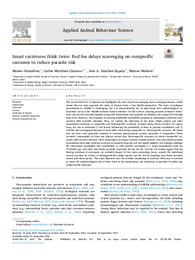Please use this identifier to cite or link to this item:
https://hdl.handle.net/11000/37978Full metadata record
| DC Field | Value | Language |
|---|---|---|
| dc.contributor.author | Gonzálvez, Moisés | - |
| dc.contributor.author | Martínez-Carrasco, Carlos | - |
| dc.contributor.author | Sánchez-Zapata, José A. | - |
| dc.contributor.author | Moleón, Marcos | - |
| dc.contributor.other | Departamentos de la UMH::Biología Aplicada | es_ES |
| dc.date.accessioned | 2025-11-10T08:59:12Z | - |
| dc.date.available | 2025-11-10T08:59:12Z | - |
| dc.date.created | 2021-09-25 | - |
| dc.identifier.citation | Applied Animal Behaviour Science 243 (2021) 105462 | es_ES |
| dc.identifier.issn | 0168-1591 | - |
| dc.identifier.uri | https://hdl.handle.net/11000/37978 | - |
| dc.description.abstract | The recent SARS-CoV-2 epidemic has highlighted the need to prevent emerging and re-emerging diseases, which means that we must approach the study of diseases from a One Health perspective. The study of pathogen transmission in wildlife is challenging, but it is unquestionably key to understand how epidemiological interactions occur at the wildlife-domestic-human interface. In this context, studying parasite avoidance behaviours may provide essential insights on parasite transmission, host-parasite coevolution, and energy flow through food-webs. However, the strategies of avoiding trophically transmitted parasites in mammalian carnivores have received little scientific attention. Here, we explore the behaviour of red foxes (Vulpes vulpes) and other mammalian carnivores at conspecific and heterospecific carnivore carcasses using videos recorded by camera traps. We aim to determine 1) the factors influencing the probability of foxes to practice cannibalism, and 2) whether the scavenging behaviour of foxes differ when facing conspecific vs. heterospecific carcasses. We found that red foxes were generally reluctant to consume mesocarnivore carrion, especially of conspecifics. When recorded, consumption by foxes was delayed several days (heterospecific carcasses) or weeks (conspecific carcasses) after carcass detection. Other mammalian scavengers showed a similar pattern. Also, meat-borne parasite transmission from wild carnivore carcasses to domestic dogs and cats was highly unlikely. Our findings challenge the widespread assumption that cannibalistic or intra-specific scavenging is a major transmission route for Trichinella spp. and other meat-borne parasites, especially for the red fox. Overall, our results suggest that the feeding decisions of scavengers are probably shaped by two main contrasting forces, namely the nutritional reward provided by carrion of phylogenetically similar species and the risk of acquiring meat-borne parasites shared with these species. This study illustrates how the detailed monitoring of carnivore behaviour is essential to assess the epidemiological role of these hosts in the maintenance and dispersion of parasites of public and animal health relevance. | es_ES |
| dc.format | application/pdf | es_ES |
| dc.format.extent | 10 | es_ES |
| dc.language.iso | eng | es_ES |
| dc.publisher | Elsevier | es_ES |
| dc.rights | info:eu-repo/semantics/openAccess | es_ES |
| dc.rights | Attribution-NonCommercial-NoDerivatives 4.0 Internacional | * |
| dc.rights.uri | http://creativecommons.org/licenses/by-nc-nd/4.0/ | * |
| dc.subject | Cannibalism | es_ES |
| dc.subject | Carnivore | es_ES |
| dc.subject | Carrion | es_ES |
| dc.subject | Landscape of disgust | es_ES |
| dc.subject | Parasite avoidance behaviour | es_ES |
| dc.subject | Parasite transmission risk | es_ES |
| dc.subject.other | CDU::5 - Ciencias puras y naturales | es_ES |
| dc.title | Smart carnivores think twice: Red fox delays scavenging on conspecific carcasses to reduce parasite risk | es_ES |
| dc.type | info:eu-repo/semantics/article | es_ES |
| dc.relation.publisherversion | https://doi.org/10.1016/j.applanim.2021.105462 | es_ES |

View/Open:
Smart carnivores think twice Red fox delays scavenging on conspecific....pdf
462,71 kB
Adobe PDF
Share:
.png)
